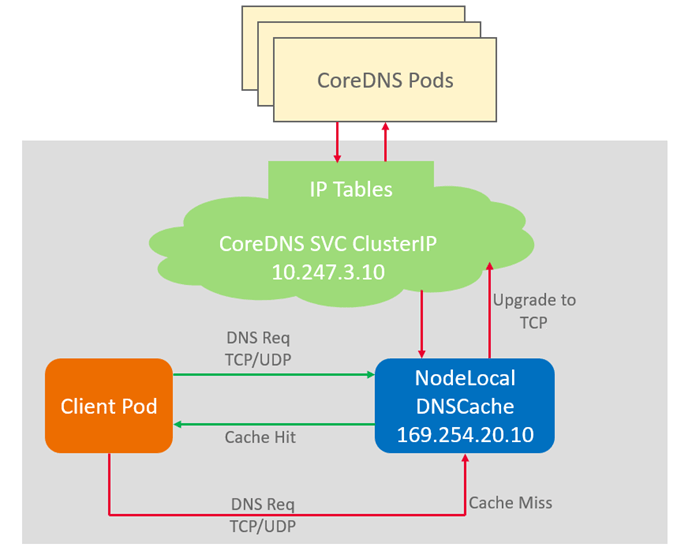Estos contenidos se han traducido de forma automática para su comodidad, pero Huawei Cloud no garantiza la exactitud de estos. Para consultar los contenidos originales, acceda a la versión en inglés.
Actualización más reciente 2024-09-10 GMT+08:00
node-local-dns
Presentación
NodeLocal DNSCache mejora el rendimiento de DNS del clúster al ejecutar proxys de caché de DNS como DaemonSets en los nodos del clúster.
Comunidad de código abierto: https://github.com/kubernetes/dns
Figura 1 Ruta de consulta de NodeLocal DNSCache


Notas y restricciones
- Esta función solo está disponible para clústeres de v1.19 y versiones posteriores.
Instalación del complemento
- Inicie sesión en la consola de CCE y acceda a la consola del clúster. Elija Add-ons en el panel de navegación, localice node-local-dns a la derecha y haga clic en Install.
- En la página Install Add-on, seleccione las especificaciones del complemento y establezca los parámetros relacionados.
Especificaciones
- Pods: Establezca el número de pods en función de los requisitos de servicio.
- Containers: Establezca una cuota de contenedor adecuada en función de los requisitos de servicio.
Parámetros- DNS Config Injection: Al habilitar la inyección de configuración de DNS, se inyectará la dirección de nodo-local-dns en nuevos pods, sin necesidad de operación manual. Una vez activada esta función, se crea un contenedor denominado node-local-dns-admission-controller para activar la inyección automática. De lo contrario, el contenedor no se crea.
- Haga clic en Install.
Historial de cambios
|
Versión del complemento |
Versión de clúster admitida |
Versión de la comunidad (solo para clústeres de v1.17 y posteriores) |
|---|---|---|
|
1.2.4 |
/v1.(19|21|23|25).*/ |
1.21.1 |
|
1.2.2 |
/v1.(19|21|23).*/ |
1.21.1 |
Tema principal: Complementos
Comentarios
¿Le pareció útil esta página?
Deje algún comentario
Muchas gracias por sus comentarios. Seguiremos trabajando para mejorar la documentación.
El sistema está ocupado. Vuelva a intentarlo más tarde.






